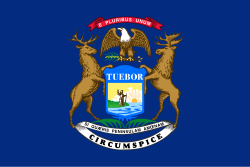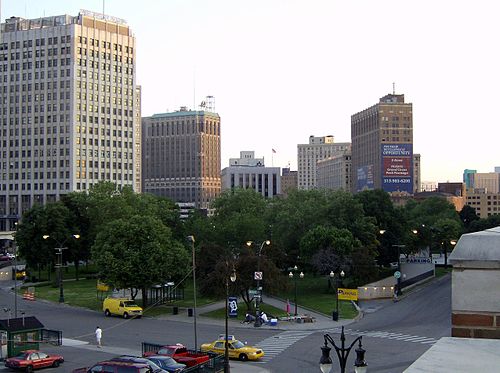Portal:Michigan
The Michigan Portal  Michigan (/ˈmɪʃɪɡən/ ⓘ MISH-ig-ən) is a peninsular state in the Great Lakes region of the Upper Midwestern United States. It shares water and land boundaries with Minnesota to the northwest, Wisconsin to the west, Indiana and Illinois to the southwest, Ohio to the southeast, and the Canadian province of Ontario to the east, northeast and north. With a population of 10.14 million and an area of 96,716 sq mi (250,490 km2), Michigan is the 10th-largest state by population, the 11th-largest by area, and the largest by total area east of the Mississippi River. The state capital is Lansing, while its most populous city is Detroit. The Metro Detroit region in Southeast Michigan is among the nation's most populous and largest metropolitan economies. Other important metropolitan areas include Grand Rapids, Flint, Ann Arbor, Kalamazoo, the Tri-Cities, and Muskegon. Michigan consists of two peninsulas: the heavily forested Upper Peninsula (commonly called "the U.P."), which juts eastward from northern Wisconsin, and the more populated Lower Peninsula, stretching north from Ohio and Indiana. The peninsulas are separated by the Straits of Mackinac, which connects Lake Michigan and Lake Huron, and are linked by the 5-mile-long Mackinac Bridge along Interstate 75. Bordering four of the five Great Lakes and Lake St. Clair, Michigan has the longest freshwater coastline of any U.S. political subdivision, measuring 3,288 miles. The state ranks second behind Alaska in water coverage by square miles and first in percentage, with approximately 42%, and it also contains 64,980 inland lakes and ponds. In the 17th century, French explorers claimed the Great Lakes region for New France, though the area had largely been inhabited for thousands of years by Indigenous peoples such as the Ojibwe, Odawa, Potawatomi, and Wyandot. French settlers and Métis established forts and settlements. Some people contend that the region’s name is derived from the Ojibwe word ᒥᓯᑲᒥ (mishigami), meaning "large water" or "large lake". While others say that it comes from the Mishiiken Tribe of Mackinac Island, also called Michinemackinawgo by Ottawa historian Andrew Blackbird, whose surrounding lands were referred to as Mishiiken-imakinakom, later shortened to Michilimackinac. After France's defeat in the French and Indian War in 1762, the area came under British control and later the U.S. following the Treaty of Paris (1783), though control remained disputed with Indigenous tribes until treaties between 1795 and 1842. The area was part of the larger Northwest Territory; the Michigan Territory was organized in 1805. Michigan was admitted as the 26th state on January 26, 1837, entering as a free state and quickly developing into an industrial and trade hub that attracted European immigrants, particularly from Finland, Macedonia, and the Netherlands. In the 1930s, migration from Appalachia, the Middle East and the Great Migration of Black Southerners further shaped the state, especially in Metro Detroit. Michigan has a diversified economy with a gross state product of $719.392 billion as of Q4 2024, ranking 14th among the 50 states. Although the state has developed a diverse economy, in the early 20th century it became widely known as the center of the U.S. automotive industry, which developed as a major national economic force. It is home to the country's three major automobile companies (whose headquarters are all in Metro Detroit). Once exploited for logging and mining, today the sparsely populated Upper Peninsula is important for tourism because of its abundance of natural resources. The Lower Peninsula is a center of manufacturing, forestry, agriculture, services, and high-tech industry. (Full article...) Entries here consist of Good and Featured articles, which meet a core set of high editorial standards.
 FanDuel Sports Network Detroit is an American regional sports network owned by Main Street Sports Group (formerly Diamond Sports Group) and operated as an affiliate of FanDuel Sports Network. It provides coverage of local sports teams in the state of Michigan, primarily focusing on those in Metro Detroit. The network airs exclusive broadcasts of games involving the Detroit Tigers, Detroit Pistons, and Detroit Red Wings; repeats of Detroit Lions preseason games; and some high school sports. FanDuel Sports Network Detroit is available on cable television throughout Michigan, as well as in northeastern Indiana, northwest Ohio and some portions of northeastern Wisconsin and nationwide on satellite via DirecTV. FanDuel Sports Network Detroit is available for streaming through DirecTV Stream and FuboTV. The network's production facilities and offices are based in Southfield, Michigan, with master control operations based at the Sinclair Broadcast Group Media Operations Center in Atlanta, Georgia. It also maintains dedicated remote sets in the concourses of Comerica Park and Little Caesars Arena. (Full article...) Selected picture - Grand Circus Park Historic District contains the five acre Grand Circus Park in downtown Detroit, Michigan that connects the theatre district with its financial center. It is bisected by Woodward Avenue, four blocks north of Campus Martius Park, and is roughly bounded by Clifford, John R. and Adams Streets. Did you know -
Related portalsSelected article -Henry Ford (July 30, 1863 – April 7, 1947) was an American industrialist and business magnate. As the founder of the Ford Motor Company, he is credited as a pioneer in making automobiles affordable for middle-class Americans through the system that came to be known as Fordism. In 1911, he was awarded a patent for the transmission mechanism that would be used in the Ford Model T and other automobiles. Ford was born in a farmhouse in Springwells Township, Michigan, and left home at the age of 16 to find work in Detroit. It was a few years before this time that Ford first experienced automobiles, and throughout the later half of the 1880s, he began repairing and later constructing engines, and through the 1890s worked with a division of Edison Electric. He founded the Ford Motor Company in 1903 after prior failures in business, but success in constructing automobiles. (Full article...) Selected biography -Adolph George "Germany" Schulz (April 19, 1883 – April 14, 1951) was an All-American American football center for the University of Michigan Wolverines from 1904 to 1905 and from 1907 to 1908. While playing at Michigan, Schulz is credited with having invented the spiral snap and with developing the practice of standing behind the defensive line. As the first lineman to play in back of the line on defense, he is credited as football's first linebacker. During his time at Michigan, Schulz also became involved in one of college football's earliest recruiting controversies, as some suggested that he was a "ringer" recruited by Michigan coach Fielding H. Yost. Schulz was 21 years old when he enrolled at Michigan and had worked in an Indiana steel mill and reportedly played for either amateur or professional teams. Michigan was refused re-entry into the Western Conference in 1908 when it insisted on playing the 25-year-old Schulz for a fourth season in violation of conference eligibility rules. (Full article...) General imagesThe following are images from various Michigan-related articles on Wikipedia.
TopicsCategoriesSymbols
Lists
Related pagesWikimediaThe following Wikimedia Foundation sister projects provide more on this subject:
Things you can doDiscover Wikipedia using portals | ||||||||||||||||||||||||||||||||||||














































































